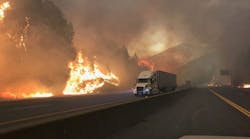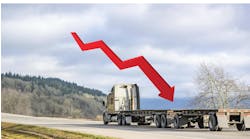Companies involved in freight transportation should consider additional steps to protect themselves from a growing number of weather-related disruptions, according the 2019 State of Logistics report.
It’s not just large-scale natural disasters such as hurricanes and wildfires that pose danger. Last year, the Federal Reserve Bank of Richmond warned scorching summer temperatures alone could dampen productivity and impede economic growth.
And BlackRock, the world’s largest asset manager, warned investors in April that markets have underpriced climate concerns and they should consider how companies will mitigate risks.
The State of Logistics report stressed that risks from climate change are growing across the United States and across all industry segments, not just the coastal ports that may need to consider expensive steps to protect against rising sea levels.
For example, in 2017, Hurricane Harvey shuttered about 16% of U.S. oil refining capacity, sending fuel prices soaring across the country and shifting some truck capacity to emergency services to aid the relief efforts in the Houston area.
Likewise, flooding across the Midwest this spring created major disruptions, and suspended service on multiple rail networks. The flooding was so widespread, rerouting capabilities were limited.
Elsewhere, the increasing number and severity of wildfires are not only endangering physical assets and employees’ lives, but also delaying flights and shutting down warehouses.
Facing these climate-related factors, the report recommends companies consider purchasing flood and business interruption insurance. In addition, they should attempt to spread inventories across a network of warehouses, in the event one becomes unavailable from a weather event.
Other suggestions include making arrangements with temporary storage providers, and identifying backup suppliers and production facilities.
While this planning costs comes at a price, sustainability and waste management efforts intended to reduce carbon emissions are proving to make good business sense.
“Companies are finding that they can be both more efficient and maintain or grow their customer base,” the report said.
The costs and risks of climate change are also likely to emerge into the debate over the next highway funding legislation in Congress next year.
Some Democrats, such as Sen. Ed Markey of Massachusetts, a member of the trucking and surface transportation panels, aim to “create standards for resilience that will ensure infrastructure money is spent on assets that will both withstand and keep communities safe from the impacts of climate change.”



